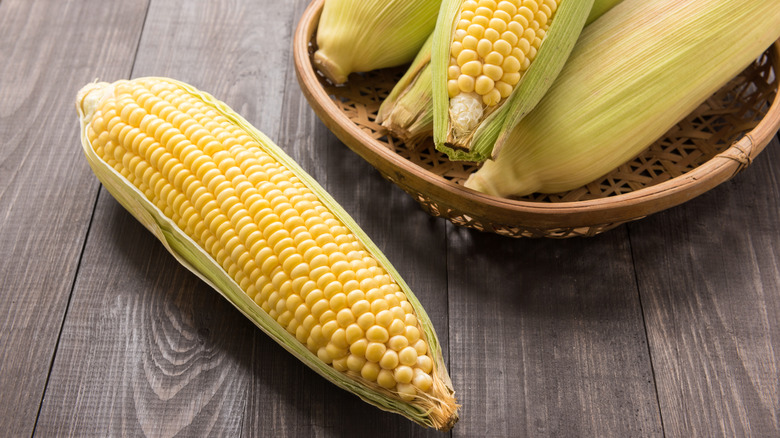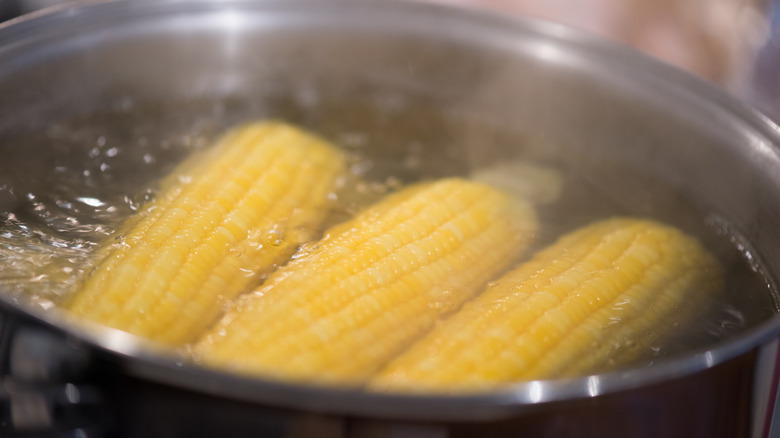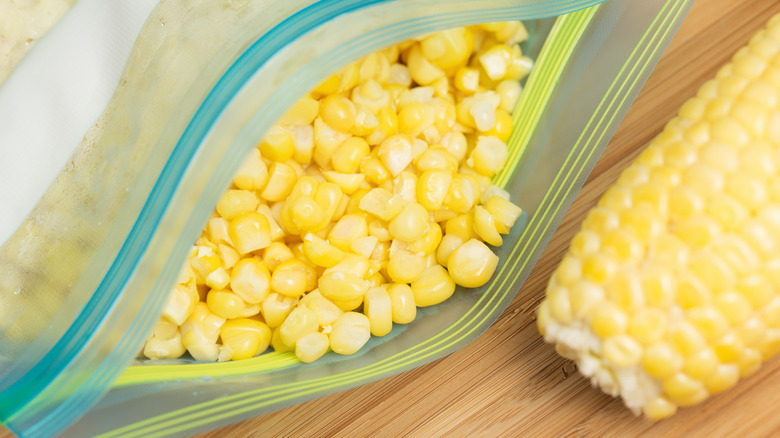Yes, You Can Definitely Freeze Corn On The Cob
Canned corn is fine, and while it's true that frozen corn is often sweeter than fresh corn on the cob, there's still nothing quite like choosing some fresh ears, and serving them right off the grill. It might have something to do with the small window of time there is to enjoy it while in season. But we have some good news for anyone who wishes they could get a taste of summer and some corn on the cob during those long winter months: You can absolutely freeze it.
Freezing corn on the cob takes a little work, but it's worth it. Imagine those deep, dark, cold winter nights — then whipping up a steak and some corn on the cob with feta and herbs. It's definitely worth setting aside some room in your freezer for that much-needed taste of summer.
That said, there are a series of steps that need to be taken in order to successfully freeze corn. If you take shortcuts or don't follow through with some of these steps, you'll have tasteless, freezer-burned corn that's mushy instead of delicious — which isn't just a waste of valuable freezer space, it's pretty heartbreaking, too.
Prep your corn on the cob before you freeze it
Freezing corn on the cob isn't as easy as just throwing some ears in the freezer and forgetting about it, and you're actually going to have to do a bit of prep. Start by shucking and cleaning the corn as if you were going to cook it right away, because you're going to have to blanch it to get it to freeze properly.
That means bringing a pot of water to a boil, then cooking the corn for just around two minutes. Pull the corn out, and move it to a bowl of ice water to let it cool completely. This is absolutely necessary for successfully freezing the corn: The blanching process will help preserve color, taste, and texture, and this is actually the same process that commercially-processed vegetables go through before they're frozen. Skip this step, and you're guaranteed to end up with mushy corn.
After the corn has cooled completely — if you're doing multiple ears, you may have to replenish your ice — there's another vital step in the process. The ears need to be dried completely before it's frozen, or water that's left on the kernels will turn to ice crystals and it'll end up not-so-fresh. Don't just wipe off the water, either. Take a baking tray, set the ears on it, and let them air dry.
Package corn individually for easy use
Once your corn is completely dry, there's a few things you can do. You can put the ears into freezer bags, seal, and freeze, or you can opt for individually wrapping them to make it easy to use just one or two at a time. There's another benefit to wrapping each ear with plastic wrap, as it'll help seal the moisture in.
You could also cut the kernels off the cob, put them in a freezer bag, squeeze out the air, and freeze them flat. (Stacking them on a baking sheet and transferring them to the freezer makes this easy.) That will help them freeze quickly and evenly, and save a ton of space.
When prepared correctly, frozen corn on the cob will last around a year, but for best results, plan on using it within six months. And using it is easy to do, as you don't have to thaw it before cooking it. Frozen kernels can be cooked just as you would cook commercially-frozen kernels, while whole ears can come right from the freezer and into the pot to be boiled as you would if you were cooking it fresh. (Pro tip: Boil corn in milk for a sweet kick.) You do, however, want to keep an eye on it, as overcooking it after it's been frozen can lead to mushy, less-than-stellar results.


